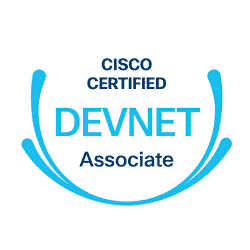Cisco DEVASC – Developing Applications and Automating Workflows using Cisco Core Platforms

The DEVASC Course Developing Applications and Automating Workflows using Cisco Core Platforms prepares participants for new professional roles capable of intercepting changes in network and infrastructure paradigms. This course introduces new professionals to core skills in network programmability, DevOps and network automation. The program is structured to transfer that emerging key technical knowledge to a new type of IT professional, essential for organizations to exploit the potential of automations in the Internet of Things (IoT), Data Center, Cloud and Software-Defined world and DevOps in general. Cisco training programs are already known throughout the world as the most important and accredited in the topics of networking, security, data centers and collaboration. The advent of DevNet programs marks a shift towards software, programming, application development, DevOps and automation. Exactly in line with the incontrovertible trend of the convergence of hardware and software into an indistinguishable unicum. In particular, this course is oriented towards the following topics: software development, software design, understanding and using APIs, application deployment and application security, automation and workflows with Cisco Core Platforms. The course helps prepare for the Cisco DevNet Associate Certification exam (Exam 200-901).
Course Objectives
Below is a summary of the main objectives of the DEVASC Course Developing Applications and Automating Workflows using Cisco Core Platforms :
- Introduction to basic skills in network programmability.
- Deep dive into DevOps and network automation.
- Knowledge of software development and software design issues.
- Understanding and using APIs.
- Focus on application deployment, application security and automation with Cisco Core Platforms.
- Exploration of Continuous Integration/Continuous Deployment (CI/CD) methodologies, focusing on their implementation in network operations and software deployment processes.
- Training in containerization technologies, such as Docker and Kubernetes, emphasizing their role in deploying and managing applications efficiently on Cisco platforms.
- In-depth study of modern monitoring and logging practices, including the use of tools like Prometheus and Grafana to monitor network and application health on Cisco infrastructure.
Course Certification
This course helps you prepare to take the:
Exam 200-901 DEVASC DevNet Associate;
Course Outline
- Practicing Modern Software Development
- Rise of APIs in Software Design
- API Data Formats
- Serialization and Deserialization of Data
- Parse API Data Formats with Python
- Collaborative Software Development
- Version Control with Git
- Branching with Git
- Use Git for Version Control
- Describing Software Development Process
- Software Development Methodologies
- Test-Driven Development
- TDD Example
- Code Review
- Designing Software
- Modular Software Design
- Modular Design Benefits
- Architecture and Design Patterns
- MVC Architecture Pattern
- Observer Design Pattern
- Identify Software Architecture and Design Patterns on a Diagram
- Implement Singleton Pattern and Abstraction-Based Method
- Introducing Network-Based APIs
- HTTP Overview
- HTTP Applied to Web-Based APIs
- Inspect HTTP Messages
- HTTP Content Negotiation
- RPC-Style APIs
- REST-Style APIs
- Postman for REST API Consumption
- Use Postman
- Advanced Postman Topics
- Troubleshoot an HTTP Error Response
- Consuming Notification Events Using Webhooks
- Consuming REST-Based APIs
- Common API Constraints
- API Authentication Mechanisms
- Using HTTP Authentication
- Utilize APIs with Python
- Leveraging HTTPS for Security
- Handling Secrets for API Consumption
- Introducing Cisco Platforms and APIs
- Cisco Network Management Platforms
- Cisco Compute Management Platforms
- Cisco Compute Management APIs
- Cisco Collaboration Platforms
- Cisco Collaboration APIs
- Cisco Security Platforms
- Cisco Security APIs
- Cisco Network Management Platforms in Cloud
- Employing Programmability on Cisco Platforms
- Automating Cisco Network Operations
- Cisco IOS XE Device-Level APIs
- Cisco NX-OS Device-Level APIs
- Cisco Controller APIs
- Use the Cisco Controller APIs
- Automating Cisco Webex Teams Operations
- Use the Cisco Webex Teams Collaboration API
- DevNet Developer Resources
- Describing IP Networks
- Basic Networking Concepts
- MAC Addresses and VLANs
- Network Routes and Routing
- Transport Layer and Packet Delivery
- Interpret a Basic Network Topology Diagram
- Network Device Planes
- Relating Network and Applications
- Standard IP Network Services
- Network Address Translation
- Common Protocols
- Application Connectivity Issues
- Tools for Troubleshooting Connectivity Issues
- Identify the Cause of Application Connectivity Issues
- Explaining the Impact of Network Constraints on Applications
- Employing Model-Driven Programmability
- Model-Driven Programmability Stack
- Network Automation and NETCONF
- Exploring AN Models
- Perform Basic NETCONF Operations
- Utilizing Data Models with RESTCONF Protocol
- Using Python Scripts and Cisco SDKs
- Use Cisco SDK and Python for Automation Scripting
- Model Driven Programmability in a Cisco Environment
- Deploying Applications
- Application Deployment Types
- Application Deployment Models
- Edge Computing Overview
- DevOps Practices and Principles
- Components of a CI-CD Pipeline
- Essential Bash Commands for Development and Operations
- Utilize Bash Commands for Local Development
- Automating Infrastructure
- SDN and Intent-Based Networking
- Infrastructure as Code
- System Management with Ansible
- Infrastructure Automation with Ansible Playbooks
- Construct Infrastructure Automation Workflow
- CI/CD Pipelines for Infrastructure Automation
- Testing and Securing Applications
- Software Test Types
- Verifying Code Behavior with Unit Tests
- Construct a Python Unit Test
- Dockerfile Composition
- Interpret a Dockerfile
- Using Docker in a Local Developer Environment
- Utilize Docker Commands to Manage Local Developer Environment
- Application Security
- Securing and Scaling Application Ingress Traffic
- Exploit Insufficient Parameter Sanitization
- Network Simulation and Test Tools
- Lab Code Reference
- Downloadable Code Per Lab
Laboratory Activities
- Parse API Data Formats with Python
- Use Git for Version Control
- Identify Software Architecture and Design Patterns on a Diagram
- Implement Singleton Pattern and Abstraction-Based Method
- Inspect HTTP Protocol Messages
- Use Postman
- Troubleshoot an HTTP Error Response
- Utilize APIs with Python
- Use the Cisco Controller APIs
- Use the Cisco Webex Teams™ Collaboration API
- Interpret a Basic Network Topology Diagram
- Identify the Cause of Application Connectivity Issues
- Perform Basic Network Configuration Protocol (NETCONF) Operations
- Use Cisco Software Development Kit (SDK) and Python for Automation Scripting
- Utilize Bash Commands for Local Development
- Construct a Python Unit Test
- Interpret a Dockerfile
- Utilize Docker Commands to Manage Local Developer Environment
- Exploit Insufficient Parameter Sanitization
- Construct Infrastructure Automation Workflow
Course Mode
Instructor-Led Remote Live Classroom Training;
Trainers
Trainers are CISCO accredited instructors and certified in other IT technologies, with years of practical experience in the sector and in training.
Lab Topology
For all types of delivery, the participant can access the equipment and actual systems in our laboratories or directly in international data centers remotely, 24/7. Each participant has access to implement various configurations, Thus immediately applying the theory learned. Below are some scenarios drawn from laboratory activities.

Course Details
Course Prerequisites
- Participation in the Cisco CCNA and Python Developer Course is recommended .
Course Duration
Intensive duration 5 days;
Course Frequency
Course Duration: 5 days (9.00 to 17.00) - Ask for other types of attendance.
Course Date
- Cisco DEVASC course (5 days) – On request – 9:00 – 17:00
Steps to Enroll
Registration takes place by asking to be contacted from the following link, or by contacting the office at the international number +355 45 301 313 or by sending a request to the email info@hadartraining.com


